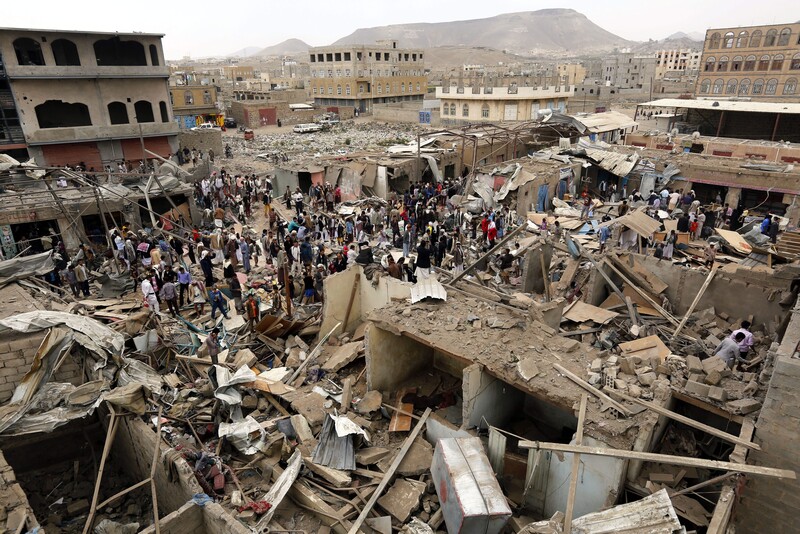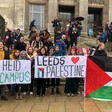The Electronic Intifada 13 February 2017

Yemenis stand in the ruins of a marketplace in Sana’a bombed in a Saudi coalition airstrike, 20 July 2015. The British arms manufacturer BAE Systems is a key exporter of weapons to Saudi Arabia.
EPAKing’s College London has given a misleading explanation about its investments in firms that supply weapons and their components to Israel and Saudi Arabia.
Over the past few months, students at the British university have been protesting at its financial connections to the arms industry.
A group called Demilitarise King’s has researched how the college invests – via funds – in such companies as BAE Systems and GE. The group has calculated that King’s has invested more than £1.5 million ($1.9 million) in the weapons trade.
Rather than address the concerns raised by the group, the chief administrator at King’s has tried to fob them off.
“King’s College London does not have any direct investments in the arms trade,” Edward Byrne, the university’s president, told The Electronic Intifada. “We only invest through funds and in so doing seek to balance our financial objectives with wider societal considerations.”
Byrne added that King’s uses a fund run by the financial services firm BlackRock, which, according to him, “purposely excludes investment in companies that produce controversial weapons.”
Distorting truth
Research undertaken by Demilitarise King’s suggests that Byrne is distorting the truth.
The research shows that King’s has invested in GE via the BlackRock fund to which Byrne referred. GE provides equipment and services to Israel through the US military aid program.
The corporation is directly involved in the production of controversial weapons. Its aviation division has, for example, provided engines for Apache helicopters, which were used extensively during Israel’s 2006 attack on Lebanon and its subsequent offensives against Gaza.
Demilitarise King’s has based its research on details obtained under freedom of information rules. The research has been carried out in cooperation with Fossil Free KCL, a campaign group demanding that the university ditch its investments in the oil and coal industries.
Demilitarise King’s has put particular emphasis on the university’s investments in BAE. Britain’s largest arms firm, BAE is a key exporter of weapons to Saudi Arabia.
In total, Britain has authorized weapons sales worth more than £3.3 billion ($4.1 billion) to Saudi Arabia since it began bombing Yemen almost two years ago. The weapons sales to Saudi Arabia have continued despite how the British government’s own export control organization has recommended that it would be “prudent and cautious” to halt them.
BAE also has a subsidiary in Jerusalem and has teamed up with Elbit, a leading supplier of drones to the Israeli military, on a variety of projects. Furthermore, BAE makes components for the F-35 warplanes assembled by Lockheed Martin, the US weapons giant.
Israel has ordered 50 of those warplanes.
Hypocrisy
The administrators at King’s have faced accusations of hypocrisy. Last month activists from Demilitarise King’s disrupted a speech that Byrne gave at the launch of a plan called “2029 Vision.”
In his introduction to that plan – which looks ahead to the university’s bicentenary in 2029 – Byrne writes that the “founding ethos of King’s” is “simply to make the world a better place.”
Despite that claim, the university has strong links to institutions that support Israeli aggression.
King’s, for example, hosts the International Centre for the Study of Radicalisation (ICSR). The ICSR was formed in partnership with the Interdisciplinary Center in Herzliya, a city in Israel.
The Interdisciplinary Center is best known for organizing an annual conference at which Israel’s political and military leaders discuss their strategies. It also runs courses in “public diplomacy” – a euphemism for propaganda – that focus on presenting Israel’s war crimes in a positive light and on countering the Palestine solidarity movement.
Byrne’s stance signals a disregard for democracy. In 2014, the student union at King’s voted to support the Palestinian call for boycott, divestment and sanctions against Israel.
The continued investment in the arms industry suggests that King’s is not paying adequate attention to the views of its students.
Shahd Abusalama is an artist from Gaza, now living in London. David Cronin is an associate editor of The Electronic Intifada.





